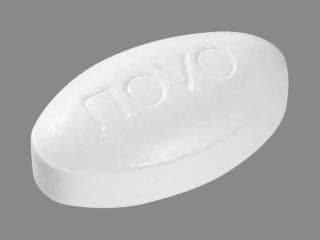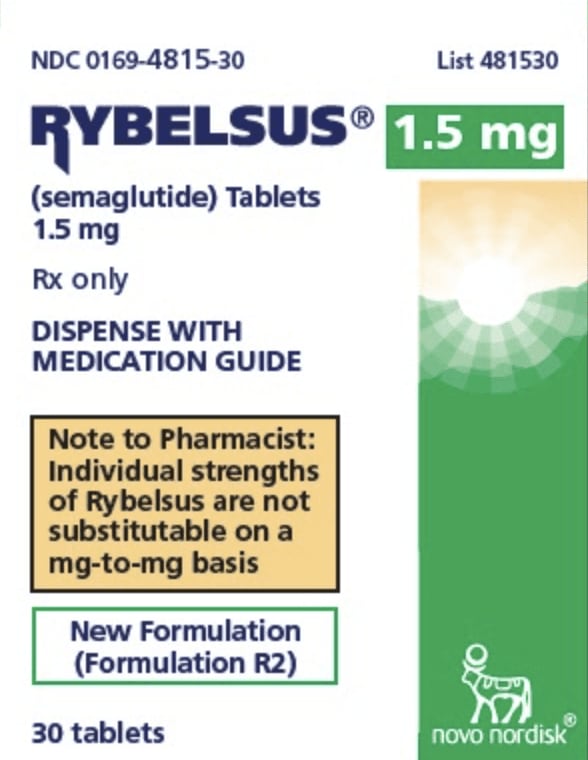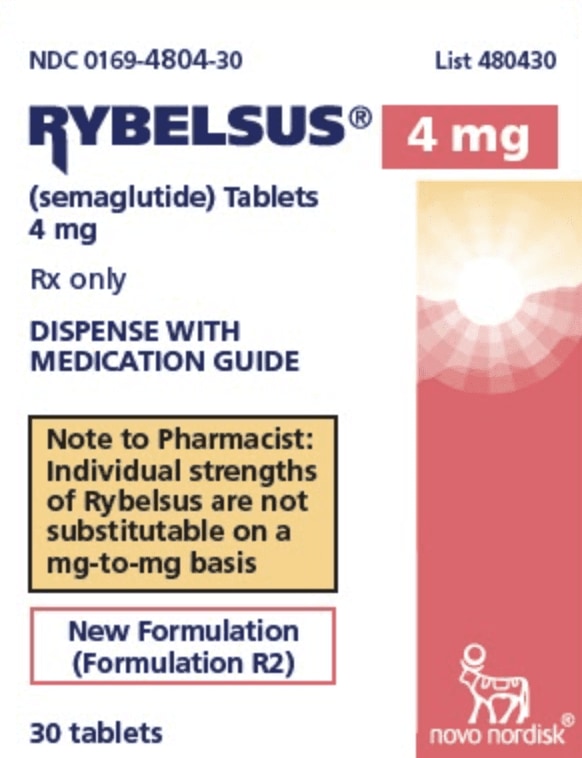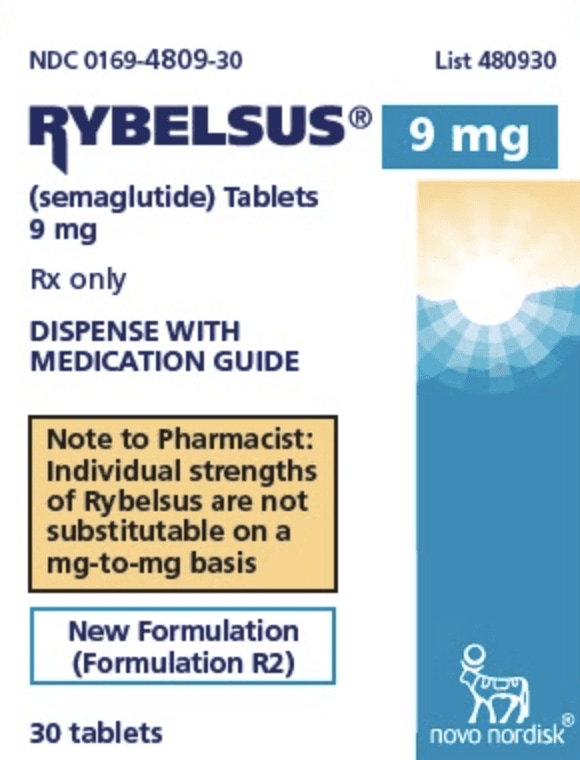What is Rybelsus?
Rybelsus is a prescription medicine used along with diet and exercise to improve blood sugar (glucose) in adults with type 2 diabetes.
- Rybelsus is not recommended as the first choice of medicine for treating diabetes.
- It is not known if Rybelsus can be used in people who have had pancreatitis.
- Rybelsus is not for use in patients with type 1 diabetes and people with diabetic ketoacidosis.
It is not known if Rybelsus is safe and effective for use in children under 18 years of age.
What is the most important information I should know about Rybelsus?
Rybelsus may cause serious side effects, including:
- Possible thyroid tumors, including cancer. Tell your healthcare provider if you get a lump or swelling in your neck, hoarseness, trouble swallowing, or shortness of breath. These may be symptoms of thyroid cancer. In studies with rodents, Rybelsus and medicines that work like Rybelsus caused thyroid tumors, including thyroid cancer. It is not known if Rybelsus will cause thyroid tumors or a type of thyroid cancer called medullary thyroid carcinoma (MTC) in people.
- Do not use Rybelsus if you or any of your family have ever had a type of thyroid cancer called medullary thyroid carcinoma (MTC), or if you have an endocrine system condition called Multiple Endocrine Neoplasia syndrome type 2 (MEN 2).
Who should not take Rybelsus?
Do not use Rybelsus if:
- you or any of your family have ever had a type of thyroid cancer called medullary thyroid carcinoma (MTC) or if you have an endocrine system condition called Multiple Endocrine Neoplasia syndrome type 2 (MEN 2).
- you are allergic to semaglutide or any of the ingredients in Rybelsus. See the end of this Medication Guide for a complete list of ingredients in Rybelsus.
What should I tell my healthcare provider before taking Rybelsus?
Before using Rybelsus, tell your healthcare provider if you have any other medical conditions, including if you:
- have or have had problems with your pancreas or kidneys.
- have a history of vision problems related to your diabetes.
- are pregnant or plan to become pregnant. It is not known if Rybelsus will harm your unborn baby. You should stop using Rybelsus 2 months before you plan to become pregnant. Talk to your healthcare provider about the best way to control your blood sugar if you plan to become pregnant or while you are pregnant.
- are breastfeeding or plan to breastfeed. Breastfeeding is not recommended during treatment with Rybelsus.
Tell your healthcare provider about all the medicines you take, including prescription and over-the-counter medicines, vitamins, and herbal supplements. Rybelsus may affect the way some medicines work and some medicines may affect the way Rybelsus works.
Before using Rybelsus, talk to your healthcare provider about low blood sugar and how to manage it. Tell your healthcare provider if you are taking other medicines to treat diabetes, including insulin or sulfonylureas.
Know the medicines you take. Keep a list of them to show your healthcare provider and pharmacist when you get a new medicine.
How should I take Rybelsus?
- Take Rybelsus exactly as your healthcare provider tells you to.
- Take Rybelsus by mouth on an empty stomach when you first wake up.
- Take Rybelsus with a sip of water (no more than 4 ounces).
- Do not split, crush or chew. Swallow Rybelsus whole.
- After 30 minutes, you can eat, drink, or take other oral medications. Rybelsus works best if you eat 30 to 60 minutes after taking Rybelsus.
- If you miss a dose of Rybelsus, skip the missed dose and go back to your regular schedule.
- Check your blood sugar as your healthcare provider tells you to.
- Stay on your prescribed diet and exercise program while using Rybelsus.
- Talk to your healthcare provider about how to prevent, recognize and manage low blood sugar (hypoglycemia), high blood sugar (hyperglycemia), and problems you have because of your diabetes.
- Your healthcare provider will check your diabetes with regular blood tests, including your blood sugar levels and your A1C.
Your dose of Rybelsus and other diabetes medicines may need to change because of:
- change in level of physical activity or exercise, weight gain or loss, increased stress, illness, change in diet, fever, trauma, infection, surgery or because of other medicines you take.
What are the possible side effects of Rybelsus?
Rybelsus may cause serious side effects, including:
- See “What is the most important information I should know about Rybelsus?”
- inflammation of your pancreas(pancreatitis). Stop using Rybelsus and call your healthcare provider right away if you have severe pain in your stomach area (abdomen) that will not go away, with or without vomiting. You may feel the pain from your abdomen to your back.
- changes in vision. Tell your healthcare provider if you have changes in vision during treatment with Rybelsus.
- low blood sugar (hypoglycemia). Your risk for getting low blood sugar may be higher if you use Rybelsus with another medicine that can cause low blood sugar, such as a sulfonylurea or insulin. Signs and symptoms of low blood sugar may include:
- dizziness or light-headedness
- blurred vision
- anxiety, irritability, or mood changes
- sweating
- slurred speech
- hunger
- confusion or drowsiness
- shakiness
- weakness
- headache
- fast heartbeat
- feeling jittery
- kidney problems (kidney failure). In people who have kidney problems, diarrhea, nausea, and vomiting may cause a loss of fluids (dehydration) which may cause kidney problems to get worse. It is important for you to drink fluids to help reduce your chance of dehydration.
- serious allergic reactions. Stop using Rybelsus and get medical help right away, if you have any symptoms of a serious allergic reaction including itching, rash, or difficulty breathing.
The most common side effects of Rybelsus may include nausea, stomach (abdominal) pain, diarrhea, decreased appetite, vomiting and constipation. Nausea, vomiting and diarrhea are most common when you first start Rybelsus.
Talk to your healthcare provider about any side effect that bothers you or does not go away. These are not all the possible side effects of Rybelsus.
Call your doctor for medical advice about side effects. You may report side effects to FDA at 1‑800‑FDA‑1088.
Rybelsus Images
General information about the safe and effective use of Rybelsus
Medicines are sometimes prescribed for purposes other than those listed in a Medication Guide. Do not use Rybelsus for a condition for which it was not prescribed. Do not give Rybelsus to other people, even if they have the same symptoms that you have. It may harm them.
You can ask your pharmacist or healthcare provider for information about Rybelsus that is written for health professionals.
How should I store Rybelsus?
- Store Rybelsus at room temperature between 68°F and 77°F (20°C to 25°C).
- Store in a dry place away from moisture.
- Store tablet in the original pack.
- Keep the tablet in the pack until you are ready to take it.
- Keep Rybelsus and all medicines out of the reach of children.
What are the ingredients in Rybelsus?
Active Ingredient: semaglutide
Inactive Ingredients: magnesium stearate, microcrystalline cellulose, povidone and salcaprozate sodium (SNAC).
For more information, go to www.RYBELSUS.com or call 1-833-GLP-PILL.











